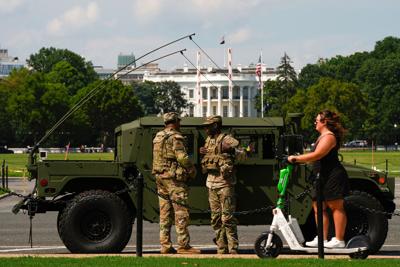This editorial was originally published by The Boston Globe and was distributed by The Associated Press.ŐżŐż
nnn
Once again, President Donald Trump has deployed the U.S. military on American soil for law-enforcement purposes. A few months ago, it was Los Angeles; this time, it’s a supposed crime wave in Washington, D.C., that has prompted Trump to flood an American city with armed soldiers.
Trump is not only misusing the soldiers, who are not trained for such a mission ‚ÄĒ he‚Äôs crossing a line that has worried America since its founding by using what the founders would have called the ‚Äústanding army‚ÄĚ for matters that should be left to civilians.
It’s clear that he intends to keep sending troops into American cities. But Americans can’t let that become the new normal.
There ought to be bipartisan pushback. After all, Republicans used to be the first to object to federal interference in local affairs. Indeed, it should not have to be said how dangerous this is: Federalized police takeovers of cities are hallmarks of autocracies. When leaders cannot govern by democratic means, they turn to force to bend citizens to their will.
And, as is often the case in backsliding democracies, they falsely claim to be acting for people’s own good.
‚ÄúOur capital city has been overtaken by violent gangs and bloodthirsty criminals, roving mobs of wild youth, drugged-out maniacs, and homeless people, and we‚Äôre not going to let it happen anymore,‚ÄĚ Trump said at a press conference last week announcing ‚ÄúLiberation Day‚ÄĚ in the capital and declaring a crime emergency.
His words are not backed up by data. Trump, though, was not deterred by facts.
Stories you might like
His announced plan is, at least in part, of debatable legality. Because of D.C.’s unique status as the nation’s capital, the president and Congress do have powers there that they lack elsewhere. Still, the law Trump cited does not allow the president to commandeer local law enforcement in Washington, as he seemed to imply. The Home Rule Act, which established D.C.’s local government, gives the president no local law enforcement powers at all, meaning he cannot direct local police to conduct patrols, detain people or arrest them.
What the law does allow is for the president to direct the local police, under Section 740, if ‚Äúspecial conditions of an emergency nature exist which require the use of the Metropolitan Police force for federal purposes.‚ÄĚ The law also caps the amount of time such emergency declaration can last to 48 hours, which can be extended to 30 days if Congress is properly notified of the action.
This is something Trump could have done, for example, on Jan. 6, 2021, during the violent siege of the U.S. Capitol to allow seamless coordination of local and federal law enforcement to assist Capitol Police in stemming the violence. But in that emergency, he chose not to.
Something else the president did in D.C. last week that he didn’t do during the Jan. 6 attack is to mobilize the D.C. National Guard. Unlike in states, where governors direct the National Guard, the D.C. National Guard reports directly to the president, who reportedly deployed about 800 troops last week.
The federal government also has some powers to deploy agents from other agencies, such as the U.S. Park Police, the Department of Homeland Security, and ICE, but the law limits some of those agency’s powers based on jurisdiction and subject matter. For example, ICE agents can only conduct civil immigration enforcement, they cannot conduct an arrest for suspected carjacking or any other local criminal action, and Park Police only have jurisdiction on federal land.
Whether all law enforcement officials are staying within legal and constitutional lines is yet to be determined. In California, where a trial is underway to determine if the administration violated the law with its deployment of the National Guard to Los Angeles, it will take months if not years for the matter to make its way through the courts. The same will be true with the latest gambit in D.C.
But in the meantime, the president and other administration officials have the visuals that fit their false narrative: nightly large law enforcement presence in myriad D.C. neighborhoods, including a traffic checkpoint last week on 14th Street in northwest D.C., a busy and popular area full of restaurants, shops, bakeries and other businesses. Jeanine Pirro, U.S. Attorney for D.C., even touted felony charges being brought against a since-fired Justice Department employee for throwing a sandwich at an officer ‚ÄĒ a moment that went viral online.
The president is taking advantage of the fact that he can implement legally and constitutionally dubious actions before courts have time to vet and stop them.
But leaders, including Republicans who have long called for limited government, should decry this and do what they can to stop this autocratic move. Whether it is part of a cynical play to the GOP’s base ahead of midterm elections, or part of a deeper plan, as outlined by the White House earlier this year to “unleash" law enforcement on American cities, the threat to America's basic form of government is the same. The military’s job is to fight America’s enemies, not to police its citizens.











